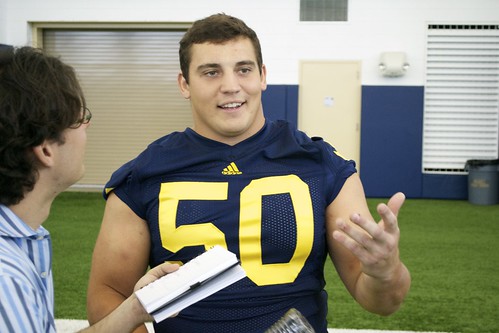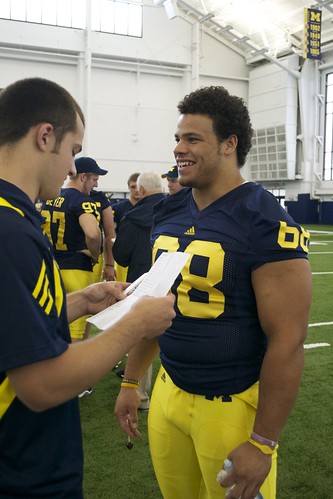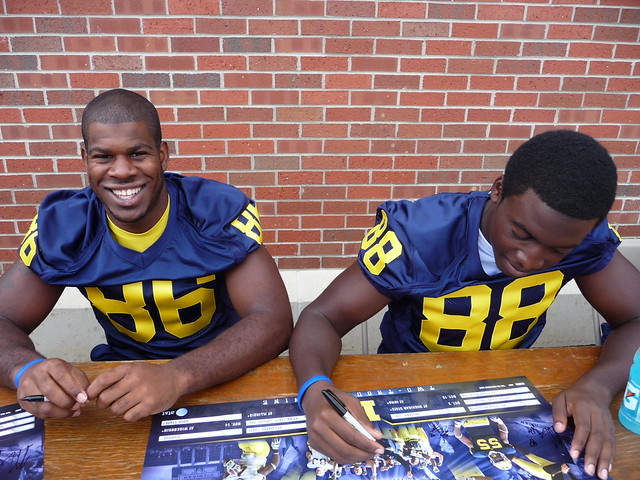Source: Dave Hogg
For Michigan fans, the Minnesota series has been one of spoiled comfort marked by occasional hardship, hardship in the sense that a loss stands out like a flamingo among a waddle of penguins. In the grand scheme of things, Michigan's three losses against the Gophers since 1967 are kind of like getting comfortable on the couch to watch something on Netflix, only to realize your computer is about to die; you'll have to get up and plug it in. Sometimes you don't make it, as Jason Giannini has kicked your power cord out the window.
In my 24 years, the Wolverines have lost the Little Brown Jug just once, in 2005. Despite coming off of a big victory in East Lansing against the then No. 11 Spartans, the Wolverines were just 3-2 heading into the Minnesota game. Even so, the Wolverines still had a shot at winning a Big Ten title, despite stubbing their toe in Madison two weeks prior.
The year before, Henne and Hart's freshman season, the Minnesota game once again went down to the wire. Chad Henne struggled, tossing two interceptions in the third quarter. If I remember correctly, backup QB Clayton Richard even came into the game for a series, although the box score says he didn't throw a pass, and my vague memories of that day nine years ago shakily confirms that fact.
The Gophers collapsed down the stretch that season, but headed into the Big House with a shiny 5-0 record (Michigan was 4-1, its lone loss coming in South Bend before Mike Hart was Mike Hart).
Eventually, Henne led one of many comeback drives to come in his Michigan career. With 3:04 to go, Henne marched the Wolverines 67 yards to a score, capped by a 31-yard strike to pre-pitch-the-ball Tyler Ecker. As a sophomore in high school making my first trip to the Big House as a person old enough to remember and acknowledge the significance such a thing (I hadn't been since I was a little kid), the victory was the greatest sporting event I had seen live at that point. Then again, I was a Chicago sports fan growing up in a post-MJ world.
I didn't really understand what the Michigan fans of 1986 and and 1977 felt when the Wolverines lost the Jug, but I would find out the next season.
So, back to 2005. Steve Breaston returned a kickoff 95 yards for a score early in the second half to put Michigan up 20-13. However, a 13-play, 61-yard Minnesota drive tied things up with six minutes to play in the third quarter.
In the 4th, Garrett Rivas missed a 34-yarder that would've given Michigan the lead with about eight minutes to go. The miss would prove costly, not that you need reminding.
With Minnesota seemingly content to just run the ball and kill the remaining couple of minutes of clock, Gary Russell busted a 61-yarder as the Michigan defense seemed to collapse like a slowly deflating bouncy castle. I often wonder what was going through Russell's mind when he saw all that space before him. Is this real? Is this happening? What is the meaning of life? If a Michigan safety falls down in the forest and no one is around, does he make a sound?
Only five seconds remained. Unlike Rivas, Minnesota PK Jason Giannini booted his 30-yarder through the uprights. On the ensuing kickoff, Steve Breaston was not able to duplicate his third quarter magic. The Wolverines lost ownership of the Jug for the first time since Jim Harbaugh wore the winged helmet.
In an altogether disappointing season--one that still ended with a shot at the Big Ten title when Ohio State came to town, mind you--that loss still sticks in my mind more than a relatively inconsequential loss should. The Notre Dame game was simply bad football against what turned out to be a solid Fighting Irish squad. The Wisconsin game can easily be chalked up to playing at a venue like Camp Randall during Barry Alvarez' swan song in Madison. The Ohio State game was crushing for the simple fact that it was Ohio State, and Michigan had the game in its hands late.
With all of that said, there's something about losing the Jug in the way that they lost it, my sarcastic hardship analogy notwithstanding. It was nonsensical, avoidable, and truly unbelievable, and not in the colloquial sense of something happening that could be believed if you think about it for just a little bit.
As painful as it is to lose the Jug, every event has its equal and opposite reaction; in no place is this more tidily accurate than in sports.
Think of how the Gophers felt in 2005, or in 1986 when they upset the undefeated, No. 2 Wolverines in the Big House. If you cannot muster the energy to care for the Jug from Michigan's vantage, think of what it means for the other side.
Back in 2004, when I didn't quite understand the meaning of the Jug, and how this could be considered a "rivalry" game at all, what I did understand was that Ecker's touchdown score was a great thing, something I'd seen and experienced live. I remember him catching the Henne bullet, shrugging two tacklers and rumbling down the left sideline--right from my perspective in the end zone--and into the end zone. The crowd roared for perhaps the first time all game. For a 14-year-old, waking up at 6 a.m. is never part of the plan; at certain points in the first half, I felt as if I might fall asleep.
I also wondered why no one was standing, but that is a gripe for another day.
As with all things, once you have it, you must keep it, lest you find out what it is to go without. Despite having won 16 in a row coming into the 2005 game, one less sent the Jug back to the Twin Cities.
The Jug is truly a supernatural thing, for with it comes the power to roll up 16 seasons into one, to negate a long steady march in one fell swoop.
Although Michigan's contests against the Gophers since 2003-05 haven't been particularly competitive, that doesn't mean that the game hasn't accrued value over time. Michigan enters this game a 19-point favorite, and Wolverine fans hope that is a reasonable assessment.
But, the Jug knows nothing of point spreads or favorites and underdogs or AP polls or relative numbers of All-Americans.
All the Jug knows, in the darkness within its painted exterior, is that it must be awarded, to one or the other. It isn't the Lombardi Trophy or the Stanley Cup, nor does it pretend to be. On Saturday, both of those crowning achievements of their respective sports will mean very little to me, because I want the Jug to stay in Ann Arbor, almost as much as I don't want it go.
In case you need one more external reason to care, remember Glen Mason in 2003:
"I'd just like to see the thing before I die."


















